2024高考英语复习语法:代词【语法精准突破】课件(知识梳理+考点精练)(共30张PPT)
文档属性
| 名称 | 2024高考英语复习语法:代词【语法精准突破】课件(知识梳理+考点精练)(共30张PPT) |

|
|
| 格式 | pptx | ||
| 文件大小 | 383.9KB | ||
| 资源类型 | 教案 | ||
| 版本资源 | 人教版(2019) | ||
| 科目 | 英语 | ||
| 更新时间 | 2023-07-06 00:00:00 | ||
图片预览

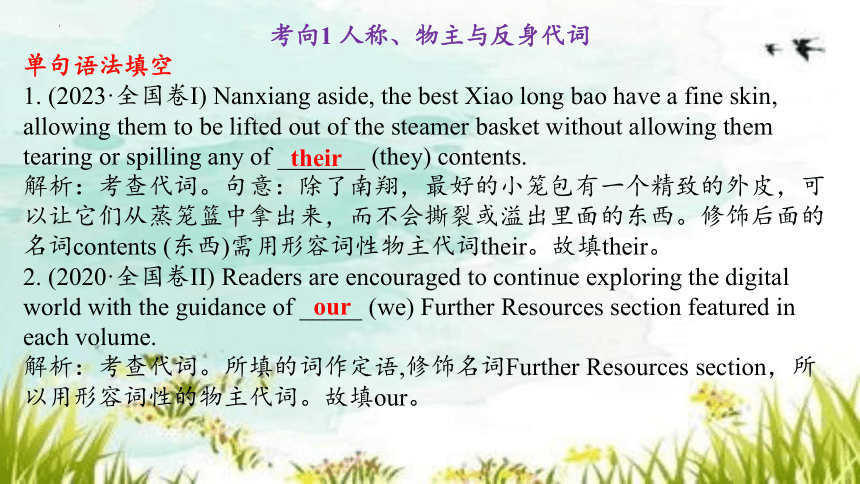
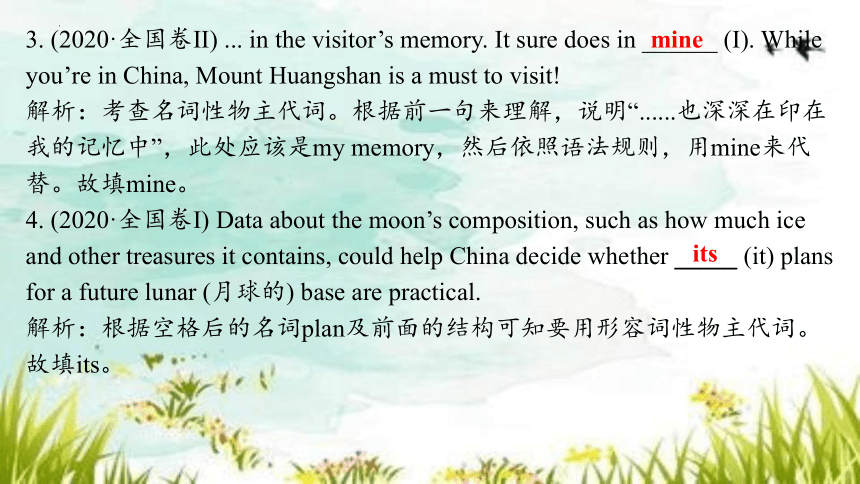
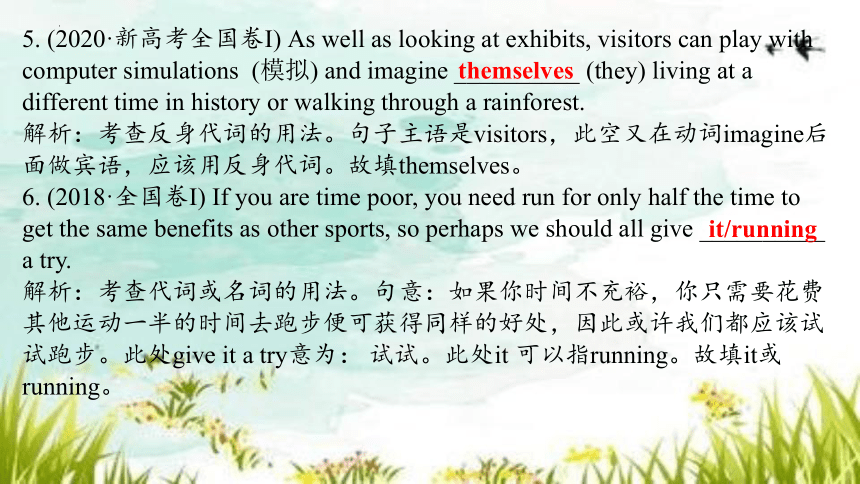


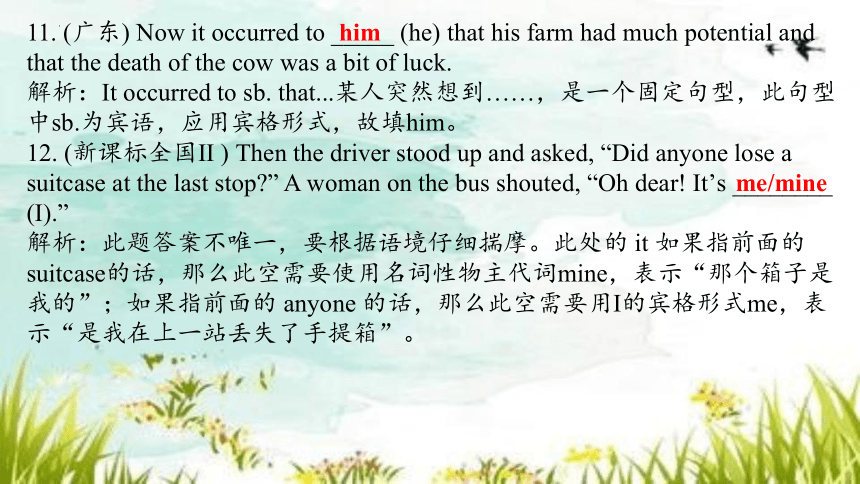

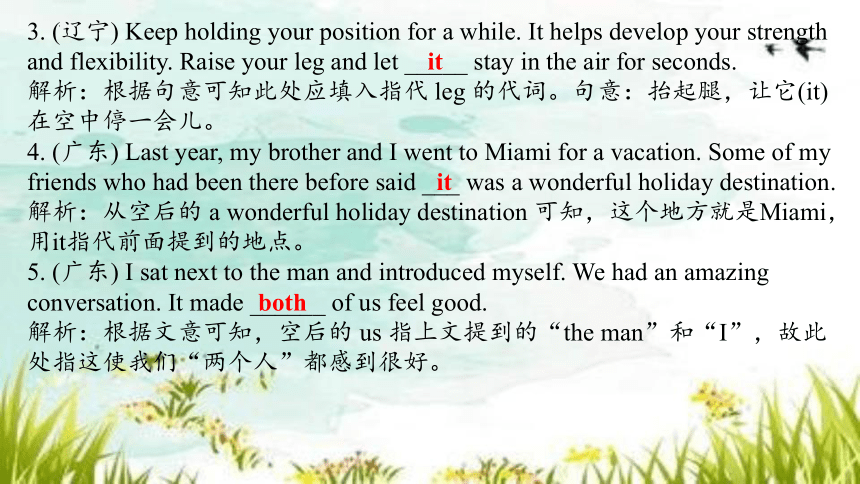
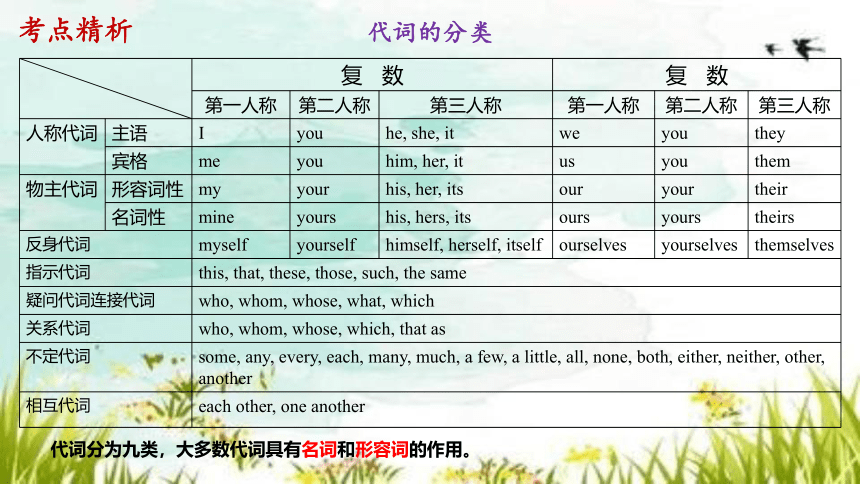
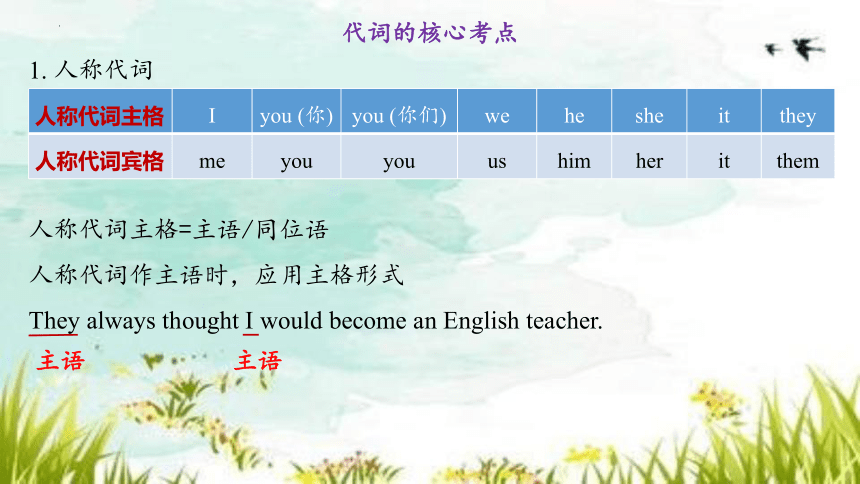
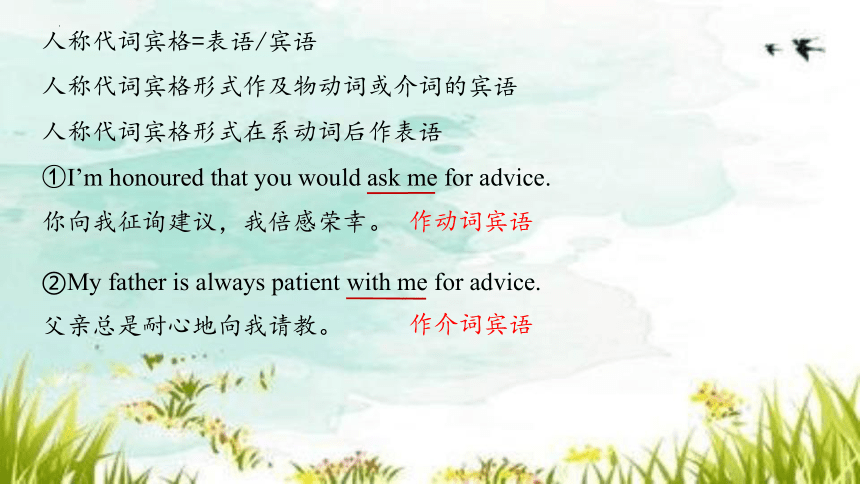
文档简介
(共30张PPT)
第二讲 不可忽视的小词:代词、冠词、介词和数词
专题1 代 词
考向1 人称、物主与反身代词
单句语法填空
1. (2023·全国卷I) Nanxiang aside, the best Xiao long bao have a fine skin, allowing them to be lifted out of the steamer basket without allowing them tearing or spilling any of _______ (they) contents.
解析:考查代词。句意:除了南翔,最好的小笼包有一个精致的外皮,可以让它们从蒸笼篮中拿出来,而不会撕裂或溢出里面的东西。修饰后面的名词contents (东西)需用形容词性物主代词their。故填their。
2. (2020·全国卷II) Readers are encouraged to continue exploring the digital world with the guidance of _____ (we) Further Resources section featured in each volume.
解析:考查代词。所填的词作定语,修饰名词Further Resources section,所以用形容词性的物主代词。故填our。
their
our
3. (2020·全国卷II) ... in the visitor’s memory. It sure does in ______ (I). While you’re in China, Mount Huangshan is a must to visit!
解析:考查名词性物主代词。根据前一句来理解,说明“......也深深在印在我的记忆中”,此处应该是my memory,然后依照语法规则,用mine来代替。故填mine。
4. (2020·全国卷I) Data about the moon’s composition, such as how much ice and other treasures it contains, could help China decide whether _____ (it) plans for a future lunar (月球的) base are practical.
解析:根据空格后的名词plan及前面的结构可知要用形容词性物主代词。故填its。
mine
its
5. (2020·新高考全国卷I) As well as looking at exhibits, visitors can play with computer simulations (模拟) and imagine __________ (they) living at a different time in history or walking through a rainforest.
解析:考查反身代词的用法。句子主语是visitors,此空又在动词imagine后面做宾语,应该用反身代词。故填themselves。
6. (2018·全国卷I) If you are time poor, you need run for only half the time to get the same benefits as other sports, so perhaps we should all give __________ a try.
解析:考查代词或名词的用法。句意:如果你时间不充裕,你只需要花费其他运动一半的时间去跑步便可获得同样的好处,因此或许我们都应该试试跑步。此处give it a try意为: 试试。此处it 可以指running。故填it或running。
themselves
it/running
7. (2018·浙江卷) Many westerners who come to China cook much less than in their own countries once they realize how cheap _____ can be to eat out.
解析:考查it用法。句子 how cheap...can be to eat out.是 由感叹句转换的宾语从句,正常语序应该是 it can be how cheap to eat out. 其中不定式 to eat out 是真正主语,it 是形式主语。故填 it。
8. (2017·浙江) Pahlsson screamed so loudly that her daughter came running from the house. “She thought I had hurt _______ (I),” says Pahlsson.
解析:句意:她原本以为我伤到了自己。根据句意可知用I 的反身代词 myself。
it
myself
9. (全国 I ) On my recent visit, I held a lively three-month-old twin that had been rejected by _____ (it) mother.
解析:根据空格后的名词及前面的 a lively three-month-old twin可知要用形容词性物主代词。故填its。
10. (全国 I ) A few hours before, I’d been at home in Hong Kong, with _____ (it) choking smog.
解析:空格后面有名词 smog,故要使用形容词性物主代词 its。
its
its
11. (广东) Now it occurred to _____ (he) that his farm had much potential and that the death of the cow was a bit of luck.
解析:It occurred to sb. that...某人突然想到……,是一个固定句型,此句型中sb.为宾语,应用宾格形式,故填him。
12. (新课标全国II ) Then the driver stood up and asked, “Did anyone lose a suitcase at the last stop ” A woman on the bus shouted, “Oh dear! It’s ________ (I).”
解析:此题答案不唯一,要根据语境仔细揣摩。此处的 it 如果指前面的suitcase的话,那么此空需要使用名词性物主代词mine,表示“那个箱子是我的”;如果指前面的 anyone 的话,那么此空需要用Ⅰ的宾格形式me,表示“是我在上一站丢失了手提箱”。
him
me/mine
考向 2 替代词及不定代词
单句语法填空
1. (2018·全国卷Ⅲ) When the gorillas and I frightened each other, I was just glad to find ______ (they) alive.
解析:考查代词。此处做 find 的宾语,所以用宾格 them。
2. (2017·全国 Ⅱ) However, the railway quickly proved to be a great success and within six months, more than 25,000 people were using ____ every day.
解析:use是及物动词,其后接宾语,此处很明显缺少代词。分析句意可知,此处用 it 指代上文提到的 the railway。
them
it
3. (辽宁) Keep holding your position for a while. It helps develop your strength and flexibility. Raise your leg and let _____ stay in the air for seconds.
解析:根据句意可知此处应填入指代 leg 的代词。句意:抬起腿,让它(it)在空中停一会儿。
4. (广东) Last year, my brother and I went to Miami for a vacation. Some of my friends who had been there before said ___ was a wonderful holiday destination.
解析:从空后的 a wonderful holiday destination 可知,这个地方就是Miami,用it指代前面提到的地点。
5. (广东) I sat next to the man and introduced myself. We had an amazing conversation. It made ______ of us feel good.
解析:根据文意可知,空后的 us 指上文提到的“the man”和“I”,故此处指这使我们“两个人”都感到很好。
it
it
both
考点精析
代词的分类
复 数 复 数
第一人称 第二人称 第三人称 第一人称 第二人称 第三人称
人称代词 主语 I you he, she, it we you they
宾格 me you him, her, it us you them
物主代词 形容词性 my your his, her, its our your their
名词性 mine yours his, hers, its ours yours theirs
反身代词 myself yourself himself, herself, itself ourselves yourselves themselves
指示代词 this, that, these, those, such, the same
疑问代词连接代词 who, whom, whose, what, which
关系代词 who, whom, whose, which, that as
不定代词 some, any, every, each, many, much, a few, a little, all, none, both, either, neither, other, another
相互代词 each other, one another
代词分为九类,大多数代词具有名词和形容词的作用。
代词的核心考点
1. 人称代词
人称代词主格 I you (你) you (你们) we he she it they
人称代词宾格 me you you us him her it them
人称代词主格=主语/同位语
人称代词作主语时,应用主格形式
They always thought I would become an English teacher.
主语
主语
人称代词宾格=表语/宾语
人称代词宾格形式作及物动词或介词的宾语
人称代词宾格形式在系动词后作表语
①I’m honoured that you would ask me for advice.
你向我征询建议,我倍感荣幸。
作动词宾语
②My father is always patient with me for advice.
父亲总是耐心地向我请教。
作介词宾语
2. 物主代词
形容词性物主代词 my your (你的) your (你们的) our his her its their
名词性物主代词 mine yours yours ours his hers its theirs
形容词性物主代词(定语)+名词形容词性物主代词起形容词作用,置于名词前作定语形容词性物主代词 +own + 名词“某人自己的……”
①She drove her car into the local game reserve.
作定语,修饰car
②They made their own clothes.
作定语,修饰clothes
名词性物主代词=形容词性物主代词+名词
名词性物主代词后不能接名词
在句中作主语、动词或介词的宾语或表语
①It’s not my phone. Mine is on the desk.
这不是我的手机,我的在桌子上。
②She’s an old friend of yours.
她是你的一个老朋友。
作主语
作宾语
2. 反身代词
单数 myself yourself himself, herself, itself
复数 ourselves yourselves themselves
动词/介词 +oneself/系动词 +oneself
反身代词在句中可作宾语、表语、同位语,但不可作主语
反身代词的人称和数必须与所指代的名词或代词的人称和数保持一致
①He knows exactly how to make himself relaxed.
他清楚地知道如何放松自己。
②I am not myself today.
今天我感觉不舒服。
作动词宾语
作表语
含反身代词的固定搭配
enjoy oneself 玩得愉快 teach oneself 自学
behave oneself 举止得体 seat oneself 坐下
come to oneself 苏醒 devote oneself to 致力于……
help oneself to 自己取用…… make oneself at home 不拘束
by oneself 独自地 of oneself 自动地
for oneself 为自己 in oneself 本身
it 的用法
it =上文出现的同一个人或事物
it 与 one/that 等代词用法在阅读理解的词义猜测题中是考查热点,应特别重视
it = 上文的原文/原物/原人 one = a(n)+ 单数可数名词
ones = 泛指的复数名词 the one = the + 单数可数名词
that = the + 单数可数名词/不可数名词 the ones/those =the +复数名词
①I left my electronic dictionary in my drawer, but now it is gone.
我把电子词典放在抽屉里,可现在不见了。
②Mr. Zhang gave me a very valuable present, one (= a present) that I had never seen.
张先生给了我一份非常珍贵的礼物,一份我从来没有见过的(礼物)。
③The population of China is larger than that (= the population) of the United States.
中国的人口比美国人口多。
④The students in Class One are more active than those (the students) in Class Four.
一班的学生比四班的学生活跃。
it 指代说话者不清楚的人/性别不明的婴儿
Someone is knocking at the door. Who might it be
有人在敲门,会是谁呢?
it指代身份不明的人
it= 时间、天气、距离、环境等
①One evening when it was so warm, I stayed awake on purpose.
有一天晚上天气很暖和,我故意不睡觉。
②It is not far from here to the hotel.
这儿离宾馆不远。
指天气
指距离
it 作形式主语、代替不定式、动名词或从句
It be + adj. ( + of/for sb. ) +不定式
It be no good/use/pleasure + doing sth.做某事没有好处/用 处/乐趣
It is worthwhile to do/doing sth. 值得做某事
It takes (+ sb.) some time/money to do sth.(某人)花时间/ 钱做某事
It is a pity/a fact/no wonder + that 从句 很遗憾……/事实 是……/难怪……
It is said/reported/believed/considered...that 从句 据说/ 报道/相信/认为……
It occurs to/hits/strikes sb. that从句 某人突然想起……
① It is foolish of you to make the same mistake again.
你太蠢了,又一次犯同样的错误。
② It is no pleasure looking through these any longer.
观看这些已经不再有趣。
③ It’s a wonder that you could finish such a hard task in such a short time.
你在如此短的时间完成这么难的任务真是个奇迹。
形式主语
真正的主语
形式主语
形式主语
真正的主语
真正的主语
it 作形式宾语→主语 + 谓语 + it + to do / doing /从句
主语 +like / enjoy / prefer / love / hate / dislike / appreciate + when/if 从句
主语 + think / believe / find / consider / feel / make 等 + it + adj./ n. (for / of sb.) to do/从句
主语 + think / believe / find / consider / feel / make 等 + it + useless / worthwhile / no use / no good + doing...
①I would appreciate it if you pay in cash.
如果你用现金支付我将不胜感激。
②I still find it hard to make good friends with them.
我仍然发现很难与他们交友。
真正的宾语
形式宾语
形式宾语
真正的宾语
it 用于固定结构
make it 成功;设法到达;约定时间
manage it 设法做成
get it 明白
take it easy 别着急
as it is 照现状
as someone put it 照某人所说
Don’t mention it.不客气。
believe it or not 信不信由你
when it comes to...谈到……
不定代词
不同范围下不定代词的使用
都 任何(一个) 都不 另外
两者 both either neither the other
三者或三者以上 all any none another
①They both like the film.
他们两个都喜欢这部电影。
②He had lost his temper and his health in the war and never found either of them again.
他的脾气和健康在战争中变得很差,并且之后再也没恢复过来。
③This cap is too small for me. Show me another (one).
这顶帽子对我来说太小了,给我再看一顶。
④The old man has two sons. One is a teacher; the other is a doctor.
这位老人有两个儿子,一个是老师,另一个是医生。
many, much, few, little
few“很少人(或事物、地方)”、a few“有些(人、事物、地 方);一些”,指代复数名词
little“不多的”,a little“少量的;一些”,指代不可数名词
many“许多”,修饰可数名词复数;much表示“许多”,修饰 不可数名词
①Fortunately, I had a little money left.
幸运的是,我剩了点钱。
②Very few of the teachers actually live here.
这些老师中几乎没有几个住在这儿。
表肯定含义,修饰 不可数名词 money
表否定含义,指代可数名词teachers
none, nothing, no one / nobody 的区别
none 指人或物,表特指,可与 of 短语连用,对应疑问词 how many / much
nothing指物,表泛指,不与of短语连用,对应疑问词 what
no one/nobody 指代人,表泛指,不与of短语连用,对应疑问词 who
①My brother would like to buy a good watch but none was available from that shop.
我哥哥想买一块手表,但是那个商店没有一块好的。
②Michael waited for an hour, but no one came.
迈克尔等了一个小时,但是没有人来。
代词的部分否定和全部否定
all, both, everyone, everybody, everything以及“every +名词”与 not 连用时,表部分否定
no one, nobody, none, neither, not...any/either 以及“no+ 名词”表全部否定
not 与总括性副词,如:everywhere, always 等连用时,也表示部分否定
①Not all the books are useful. /All the books are not useful.
并非所有书都有用。
②Not both books are interesting. / Both books are not interesting.
并非两本书都有趣。
③Every student doesn’t go to school on Sunday.
并非每个学生周日都去学校。
④Not everybody in our class likes reading.
并非我们班的每个人都喜欢阅读。
⑤He knows not everything about it.
他对此事并非全都知道。
习惯搭配中的不定代词
nothing but 仅仅;只是
anything but 决不
each other(两者)互相
one another (三者或以上)互相
one after another 一个接一个
every other day 每隔一天
some...others...一些……另一些……
some..., the others..一些……,其余的全部……
one..., the others...一个……,其余的全部……
some... some...others..有些……,有些……,另一些……
1.单句语法填空
1. It’s a tiring job. I have to work whenever there are dogs at home, and no time to enjoy ________ (I).
2. Jack and Tom are good friends and ______ are in the same class.
3. When living overseas in a place where people speak a different language, ___ can be difficult to make yourself understood.
4. The cost of renting a house in central Xi’an is higher than ______ in any other area of the city.
5. Larry asks Bill and Peter to go on a picnic with him, but ________ of them wants to, because they have work to do.
myself
they
it
that
neither
Ⅱ.语法填空(代词专练)
I can’t believe I made _____ into San Francisco at last!
This morning, I went to the airport by _______ (I) to catch my 10 :00 a. m. flight. I got there early to go through security. Since I had an electronic ticket, _______ was more convenient, I then went straight to the boarding gate. When I got there, I couldn’t believe _____ ears—it was announced that the flight was put off for two hours!
I made a decision to look at the flight monitors to see __________ there was an earlier flight to San Francisco. I saw that there was ________ flight that will leave in 40 minutes, so I ran to the boarding gate of _____ flight. When I got there, I asked the gate agent if I could get on that flight instead. She said that I needed to stay in the gate area and wait for my name to be called if _____ had a seat available. So,I waited, and waited, and waited. _____ the passengers were waiting impatiently.
The gate agent began calling out names. Guess what I found ________ was behind me. The last name called was _____. The last seat left on the plane was a middle seat and I usually prefer _____ near a window, but I was just happy to get on board. I didn’t want my vacation to get delayed because of a late flight.
it
myself
which
my
if/whether
another
that
they
All
nobody
mine
one
Thank you
第二讲 不可忽视的小词:代词、冠词、介词和数词
专题1 代 词
考向1 人称、物主与反身代词
单句语法填空
1. (2023·全国卷I) Nanxiang aside, the best Xiao long bao have a fine skin, allowing them to be lifted out of the steamer basket without allowing them tearing or spilling any of _______ (they) contents.
解析:考查代词。句意:除了南翔,最好的小笼包有一个精致的外皮,可以让它们从蒸笼篮中拿出来,而不会撕裂或溢出里面的东西。修饰后面的名词contents (东西)需用形容词性物主代词their。故填their。
2. (2020·全国卷II) Readers are encouraged to continue exploring the digital world with the guidance of _____ (we) Further Resources section featured in each volume.
解析:考查代词。所填的词作定语,修饰名词Further Resources section,所以用形容词性的物主代词。故填our。
their
our
3. (2020·全国卷II) ... in the visitor’s memory. It sure does in ______ (I). While you’re in China, Mount Huangshan is a must to visit!
解析:考查名词性物主代词。根据前一句来理解,说明“......也深深在印在我的记忆中”,此处应该是my memory,然后依照语法规则,用mine来代替。故填mine。
4. (2020·全国卷I) Data about the moon’s composition, such as how much ice and other treasures it contains, could help China decide whether _____ (it) plans for a future lunar (月球的) base are practical.
解析:根据空格后的名词plan及前面的结构可知要用形容词性物主代词。故填its。
mine
its
5. (2020·新高考全国卷I) As well as looking at exhibits, visitors can play with computer simulations (模拟) and imagine __________ (they) living at a different time in history or walking through a rainforest.
解析:考查反身代词的用法。句子主语是visitors,此空又在动词imagine后面做宾语,应该用反身代词。故填themselves。
6. (2018·全国卷I) If you are time poor, you need run for only half the time to get the same benefits as other sports, so perhaps we should all give __________ a try.
解析:考查代词或名词的用法。句意:如果你时间不充裕,你只需要花费其他运动一半的时间去跑步便可获得同样的好处,因此或许我们都应该试试跑步。此处give it a try意为: 试试。此处it 可以指running。故填it或running。
themselves
it/running
7. (2018·浙江卷) Many westerners who come to China cook much less than in their own countries once they realize how cheap _____ can be to eat out.
解析:考查it用法。句子 how cheap...can be to eat out.是 由感叹句转换的宾语从句,正常语序应该是 it can be how cheap to eat out. 其中不定式 to eat out 是真正主语,it 是形式主语。故填 it。
8. (2017·浙江) Pahlsson screamed so loudly that her daughter came running from the house. “She thought I had hurt _______ (I),” says Pahlsson.
解析:句意:她原本以为我伤到了自己。根据句意可知用I 的反身代词 myself。
it
myself
9. (全国 I ) On my recent visit, I held a lively three-month-old twin that had been rejected by _____ (it) mother.
解析:根据空格后的名词及前面的 a lively three-month-old twin可知要用形容词性物主代词。故填its。
10. (全国 I ) A few hours before, I’d been at home in Hong Kong, with _____ (it) choking smog.
解析:空格后面有名词 smog,故要使用形容词性物主代词 its。
its
its
11. (广东) Now it occurred to _____ (he) that his farm had much potential and that the death of the cow was a bit of luck.
解析:It occurred to sb. that...某人突然想到……,是一个固定句型,此句型中sb.为宾语,应用宾格形式,故填him。
12. (新课标全国II ) Then the driver stood up and asked, “Did anyone lose a suitcase at the last stop ” A woman on the bus shouted, “Oh dear! It’s ________ (I).”
解析:此题答案不唯一,要根据语境仔细揣摩。此处的 it 如果指前面的suitcase的话,那么此空需要使用名词性物主代词mine,表示“那个箱子是我的”;如果指前面的 anyone 的话,那么此空需要用Ⅰ的宾格形式me,表示“是我在上一站丢失了手提箱”。
him
me/mine
考向 2 替代词及不定代词
单句语法填空
1. (2018·全国卷Ⅲ) When the gorillas and I frightened each other, I was just glad to find ______ (they) alive.
解析:考查代词。此处做 find 的宾语,所以用宾格 them。
2. (2017·全国 Ⅱ) However, the railway quickly proved to be a great success and within six months, more than 25,000 people were using ____ every day.
解析:use是及物动词,其后接宾语,此处很明显缺少代词。分析句意可知,此处用 it 指代上文提到的 the railway。
them
it
3. (辽宁) Keep holding your position for a while. It helps develop your strength and flexibility. Raise your leg and let _____ stay in the air for seconds.
解析:根据句意可知此处应填入指代 leg 的代词。句意:抬起腿,让它(it)在空中停一会儿。
4. (广东) Last year, my brother and I went to Miami for a vacation. Some of my friends who had been there before said ___ was a wonderful holiday destination.
解析:从空后的 a wonderful holiday destination 可知,这个地方就是Miami,用it指代前面提到的地点。
5. (广东) I sat next to the man and introduced myself. We had an amazing conversation. It made ______ of us feel good.
解析:根据文意可知,空后的 us 指上文提到的“the man”和“I”,故此处指这使我们“两个人”都感到很好。
it
it
both
考点精析
代词的分类
复 数 复 数
第一人称 第二人称 第三人称 第一人称 第二人称 第三人称
人称代词 主语 I you he, she, it we you they
宾格 me you him, her, it us you them
物主代词 形容词性 my your his, her, its our your their
名词性 mine yours his, hers, its ours yours theirs
反身代词 myself yourself himself, herself, itself ourselves yourselves themselves
指示代词 this, that, these, those, such, the same
疑问代词连接代词 who, whom, whose, what, which
关系代词 who, whom, whose, which, that as
不定代词 some, any, every, each, many, much, a few, a little, all, none, both, either, neither, other, another
相互代词 each other, one another
代词分为九类,大多数代词具有名词和形容词的作用。
代词的核心考点
1. 人称代词
人称代词主格 I you (你) you (你们) we he she it they
人称代词宾格 me you you us him her it them
人称代词主格=主语/同位语
人称代词作主语时,应用主格形式
They always thought I would become an English teacher.
主语
主语
人称代词宾格=表语/宾语
人称代词宾格形式作及物动词或介词的宾语
人称代词宾格形式在系动词后作表语
①I’m honoured that you would ask me for advice.
你向我征询建议,我倍感荣幸。
作动词宾语
②My father is always patient with me for advice.
父亲总是耐心地向我请教。
作介词宾语
2. 物主代词
形容词性物主代词 my your (你的) your (你们的) our his her its their
名词性物主代词 mine yours yours ours his hers its theirs
形容词性物主代词(定语)+名词形容词性物主代词起形容词作用,置于名词前作定语形容词性物主代词 +own + 名词“某人自己的……”
①She drove her car into the local game reserve.
作定语,修饰car
②They made their own clothes.
作定语,修饰clothes
名词性物主代词=形容词性物主代词+名词
名词性物主代词后不能接名词
在句中作主语、动词或介词的宾语或表语
①It’s not my phone. Mine is on the desk.
这不是我的手机,我的在桌子上。
②She’s an old friend of yours.
她是你的一个老朋友。
作主语
作宾语
2. 反身代词
单数 myself yourself himself, herself, itself
复数 ourselves yourselves themselves
动词/介词 +oneself/系动词 +oneself
反身代词在句中可作宾语、表语、同位语,但不可作主语
反身代词的人称和数必须与所指代的名词或代词的人称和数保持一致
①He knows exactly how to make himself relaxed.
他清楚地知道如何放松自己。
②I am not myself today.
今天我感觉不舒服。
作动词宾语
作表语
含反身代词的固定搭配
enjoy oneself 玩得愉快 teach oneself 自学
behave oneself 举止得体 seat oneself 坐下
come to oneself 苏醒 devote oneself to 致力于……
help oneself to 自己取用…… make oneself at home 不拘束
by oneself 独自地 of oneself 自动地
for oneself 为自己 in oneself 本身
it 的用法
it =上文出现的同一个人或事物
it 与 one/that 等代词用法在阅读理解的词义猜测题中是考查热点,应特别重视
it = 上文的原文/原物/原人 one = a(n)+ 单数可数名词
ones = 泛指的复数名词 the one = the + 单数可数名词
that = the + 单数可数名词/不可数名词 the ones/those =the +复数名词
①I left my electronic dictionary in my drawer, but now it is gone.
我把电子词典放在抽屉里,可现在不见了。
②Mr. Zhang gave me a very valuable present, one (= a present) that I had never seen.
张先生给了我一份非常珍贵的礼物,一份我从来没有见过的(礼物)。
③The population of China is larger than that (= the population) of the United States.
中国的人口比美国人口多。
④The students in Class One are more active than those (the students) in Class Four.
一班的学生比四班的学生活跃。
it 指代说话者不清楚的人/性别不明的婴儿
Someone is knocking at the door. Who might it be
有人在敲门,会是谁呢?
it指代身份不明的人
it= 时间、天气、距离、环境等
①One evening when it was so warm, I stayed awake on purpose.
有一天晚上天气很暖和,我故意不睡觉。
②It is not far from here to the hotel.
这儿离宾馆不远。
指天气
指距离
it 作形式主语、代替不定式、动名词或从句
It be + adj. ( + of/for sb. ) +不定式
It be no good/use/pleasure + doing sth.做某事没有好处/用 处/乐趣
It is worthwhile to do/doing sth. 值得做某事
It takes (+ sb.) some time/money to do sth.(某人)花时间/ 钱做某事
It is a pity/a fact/no wonder + that 从句 很遗憾……/事实 是……/难怪……
It is said/reported/believed/considered...that 从句 据说/ 报道/相信/认为……
It occurs to/hits/strikes sb. that从句 某人突然想起……
① It is foolish of you to make the same mistake again.
你太蠢了,又一次犯同样的错误。
② It is no pleasure looking through these any longer.
观看这些已经不再有趣。
③ It’s a wonder that you could finish such a hard task in such a short time.
你在如此短的时间完成这么难的任务真是个奇迹。
形式主语
真正的主语
形式主语
形式主语
真正的主语
真正的主语
it 作形式宾语→主语 + 谓语 + it + to do / doing /从句
主语 +like / enjoy / prefer / love / hate / dislike / appreciate + when/if 从句
主语 + think / believe / find / consider / feel / make 等 + it + adj./ n. (for / of sb.) to do/从句
主语 + think / believe / find / consider / feel / make 等 + it + useless / worthwhile / no use / no good + doing...
①I would appreciate it if you pay in cash.
如果你用现金支付我将不胜感激。
②I still find it hard to make good friends with them.
我仍然发现很难与他们交友。
真正的宾语
形式宾语
形式宾语
真正的宾语
it 用于固定结构
make it 成功;设法到达;约定时间
manage it 设法做成
get it 明白
take it easy 别着急
as it is 照现状
as someone put it 照某人所说
Don’t mention it.不客气。
believe it or not 信不信由你
when it comes to...谈到……
不定代词
不同范围下不定代词的使用
都 任何(一个) 都不 另外
两者 both either neither the other
三者或三者以上 all any none another
①They both like the film.
他们两个都喜欢这部电影。
②He had lost his temper and his health in the war and never found either of them again.
他的脾气和健康在战争中变得很差,并且之后再也没恢复过来。
③This cap is too small for me. Show me another (one).
这顶帽子对我来说太小了,给我再看一顶。
④The old man has two sons. One is a teacher; the other is a doctor.
这位老人有两个儿子,一个是老师,另一个是医生。
many, much, few, little
few“很少人(或事物、地方)”、a few“有些(人、事物、地 方);一些”,指代复数名词
little“不多的”,a little“少量的;一些”,指代不可数名词
many“许多”,修饰可数名词复数;much表示“许多”,修饰 不可数名词
①Fortunately, I had a little money left.
幸运的是,我剩了点钱。
②Very few of the teachers actually live here.
这些老师中几乎没有几个住在这儿。
表肯定含义,修饰 不可数名词 money
表否定含义,指代可数名词teachers
none, nothing, no one / nobody 的区别
none 指人或物,表特指,可与 of 短语连用,对应疑问词 how many / much
nothing指物,表泛指,不与of短语连用,对应疑问词 what
no one/nobody 指代人,表泛指,不与of短语连用,对应疑问词 who
①My brother would like to buy a good watch but none was available from that shop.
我哥哥想买一块手表,但是那个商店没有一块好的。
②Michael waited for an hour, but no one came.
迈克尔等了一个小时,但是没有人来。
代词的部分否定和全部否定
all, both, everyone, everybody, everything以及“every +名词”与 not 连用时,表部分否定
no one, nobody, none, neither, not...any/either 以及“no+ 名词”表全部否定
not 与总括性副词,如:everywhere, always 等连用时,也表示部分否定
①Not all the books are useful. /All the books are not useful.
并非所有书都有用。
②Not both books are interesting. / Both books are not interesting.
并非两本书都有趣。
③Every student doesn’t go to school on Sunday.
并非每个学生周日都去学校。
④Not everybody in our class likes reading.
并非我们班的每个人都喜欢阅读。
⑤He knows not everything about it.
他对此事并非全都知道。
习惯搭配中的不定代词
nothing but 仅仅;只是
anything but 决不
each other(两者)互相
one another (三者或以上)互相
one after another 一个接一个
every other day 每隔一天
some...others...一些……另一些……
some..., the others..一些……,其余的全部……
one..., the others...一个……,其余的全部……
some... some...others..有些……,有些……,另一些……
1.单句语法填空
1. It’s a tiring job. I have to work whenever there are dogs at home, and no time to enjoy ________ (I).
2. Jack and Tom are good friends and ______ are in the same class.
3. When living overseas in a place where people speak a different language, ___ can be difficult to make yourself understood.
4. The cost of renting a house in central Xi’an is higher than ______ in any other area of the city.
5. Larry asks Bill and Peter to go on a picnic with him, but ________ of them wants to, because they have work to do.
myself
they
it
that
neither
Ⅱ.语法填空(代词专练)
I can’t believe I made _____ into San Francisco at last!
This morning, I went to the airport by _______ (I) to catch my 10 :00 a. m. flight. I got there early to go through security. Since I had an electronic ticket, _______ was more convenient, I then went straight to the boarding gate. When I got there, I couldn’t believe _____ ears—it was announced that the flight was put off for two hours!
I made a decision to look at the flight monitors to see __________ there was an earlier flight to San Francisco. I saw that there was ________ flight that will leave in 40 minutes, so I ran to the boarding gate of _____ flight. When I got there, I asked the gate agent if I could get on that flight instead. She said that I needed to stay in the gate area and wait for my name to be called if _____ had a seat available. So,I waited, and waited, and waited. _____ the passengers were waiting impatiently.
The gate agent began calling out names. Guess what I found ________ was behind me. The last name called was _____. The last seat left on the plane was a middle seat and I usually prefer _____ near a window, but I was just happy to get on board. I didn’t want my vacation to get delayed because of a late flight.
it
myself
which
my
if/whether
another
that
they
All
nobody
mine
one
Thank you
